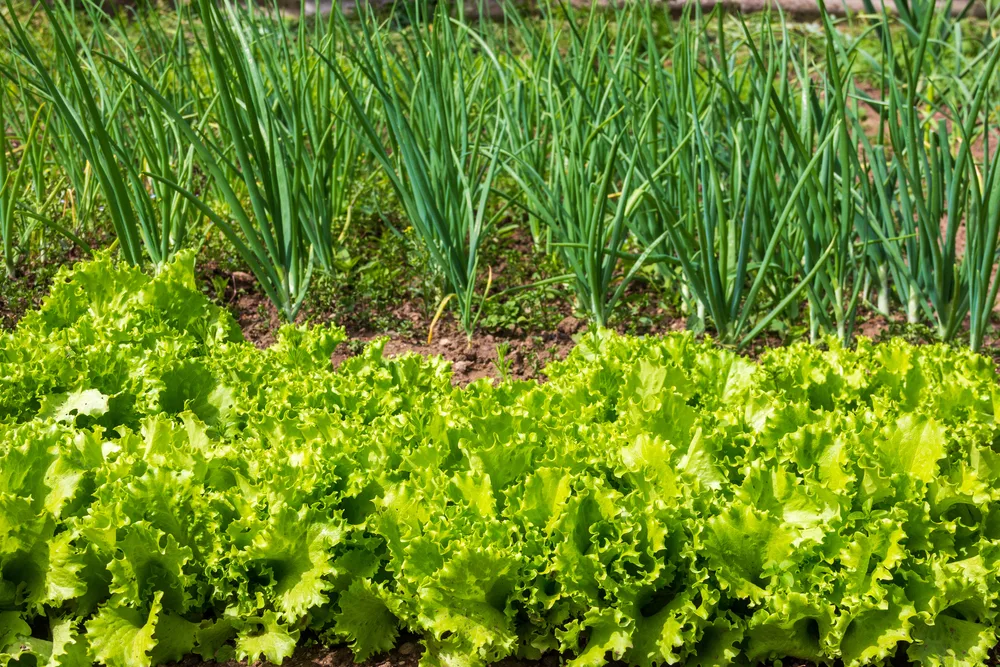Companion planting is a practice that involves planting different types of plants together for mutual benefit. This method creates a biodiverse environment that encourages growth and reduces pest problems.
Onion companion plants are particularly beneficial, as they work well with a range of different garden vegetables, herbs, and flowers.
In this article, we will guide you through the best companion plants for onions and show you how to plant them together for optimal results.
Learn how to manage pests and diseases with the help of onion companion plants, and gain insights into harvesting and caring for your onion garden!
Benefits of Companion Planting With Onions

When you plant onions alongside other vegetables, you’ll enjoy the benefits of improved pest control and increased yields.
Onions are known for their natural pest-repellent properties, which help protect neighboring plants from harmful insects. They release a strong odor that deters pests, reducing the need for chemical pesticides.
Additionally, onions have a symbiotic relationship with certain vegetables, such as carrots and tomatoes. The combination of these plants can enhance each other’s growth and productivity.
Finally, onions have shallow roots, which helps to break up the soil and improve its structure. It allows better water penetration and nutrient absorption for all the plants in the vicinity.
Best Companion Plants for Onions

Here are three companion plants that can enhance the growth and health of your onions:
1. Lettuce
Planting lettuce near your onions can provide them with shade and help conserve moisture in the soil. Lettuce also acts as a natural weed suppressor, reducing competition for nutrients and water.
2. Carrots
Carrots make great companions for onions as they help deter onion flies, a common pest that can damage onion bulbs. Besides, carrots have a shallow root system. As a result, they won’t compete heavily with the onions for nutrients.
3. Chamomile
Chamomile is not only a calming herbal tea, but it also has beneficial properties for your onions. Planting chamomile near your onions can help improve their flavor and overall health. It also attracts beneficial insects that can help control pests.
How to Plant Onions With Companions
When planting onions, choose companion plants that provide some shade to protect the onion bulbs from excessive heat. Plants like lettuce, spinach, and radishes make great shade providers.
You should also consider planting onions with herbs like thyme, rosemary, and chamomile, which act as natural pest deterrents. These herbs release aromas that repel pests, keeping your onions safe from harm.
To enhance the flavor of your onions, you can plant them alongside carrots, beets, or strawberries. These plants not only add a delicious taste to your onions but also help improve their overall growth.
Managing Pests and Diseases With Onion Companion Plants
Choosing the right herbs and vegetables to plant alongside onions is a straightforward way to manage pests and diseases.
Here are three companion plants that can help keep your onions healthy and pest-free:
- Basil: Planting basil near onions can deter aphids and flies, which are common pests that attack onions. The intense aroma of basil acts as a natural repellent, keeping these pests at bay.
- Carrots: As mentioned earlier, onions and carrots make great companions in the garden. Carrots help repel onion flies, which are notorious for attacking onion plants. Also, the strong scent of onions can help mask the smell of carrots, making it harder for carrot flies to locate them.
- Lettuce: Planting lettuce alongside onions provides a beneficial cooling effect on the soil, which can help reduce the risk of onion diseases. Lettuce also acts as a living mulch, shading the soil and preventing weed growth.
Conclusion

As you tend to your garden, keep in mind that companion plants play a crucial role in supporting the growth and well-being of onions.
After all, harvesting and caring for the companion plants is essential to maintain a healthy garden ecosystem.
When it comes to harvesting, be mindful of the timing. Harvesting onions at the right time ensures they reach their full potential and flavor.
As for caring, regular watering and weeding are necessary to keep the companion plants healthy. Mulching around the plants helps to retain moisture and suppress weeds.
Pruning any damaged or diseased foliage is also highly advised. Doing so promotes air circulation and prevents the spread of diseases.
FAQs
Is it possible to plant onions with other onion family plants?
It’s advised to avoid planting onions with other onion family plants, like garlic and shallots, as they tend to attract similar pests.
Can onion companion planting help in soil conservation?
Yes, it can! Onions have shallow roots, which help to break up the soil and improve its structure. It allows for better water penetration and nutrient absorption, benefiting other companion plants.
What are the effects of onions on the flavor of companion plants?
While onions can enhance the flavor of some companion plants, there isn’t a significant alteration for most — unless they’re root vegetables grown very close to the onions.
How large should the planting area be for companion planting with onions?
The size of the planting area will depend on the amount of each plant you wish to grow. Ideally, onions should be spaced 4-6 inches apart, and companion plants should be spaced according to their specific requirements.
Can I plant my onions with other strong-smelling herbs like mint?
Although it sounds intuitive, it’s not recommended. For example, mint tends to be invasive and might out-compete the onions for nutrients and space.
Was it helpful?

Enamored with the world of golf Jack pursued a degree in Golf Course Management at THE Ohio State University. This career path allowed him to work on some of the highest profile golf courses in the country! Due to the pandemic, Jack began Inside The Yard as a side hustle that quickly became his main hustle. Since starting the company, Jack has relocated to a homestead in Central Arkansas where he and his wife raise cattle and two little girls.

